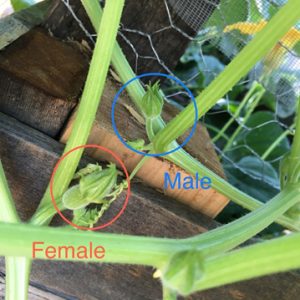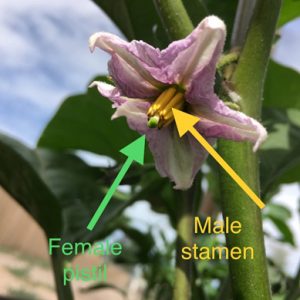Written by: Kristina Langan, Colorado Master Gardener Apprentice, 2020
The other day a friend initiated a conversation about lack of tomato flowers and lack of tomato fruits. I have quite a few flowers, but it got me thinking about hand-pollinating, as I have planted quite a few different kinds of tomatoes, and I don’t want them to cross-pollinate.
So I took a look today and I could not tell the male flowers from the female flowers. (Read on, oh knowledgeable ones, read on). Time for Google. And time for MUCH learning. Which I will now impart to you, dear readers.
It turns out that tomato flowers have both female and male parts (pistil and stamens) on the same flower! This is called a “perfect” flower. Good job, ‘maters! These are also known as “bisexual” or “complete” flowers. Other vegetable plants with perfect flowers are: tomatillos, peppers, eggplant, okra, peas, and beans.
 As you may have noticed, zucchini, pumpkin, cucumber and watermelon are not like this. I have noticed this in the past because the stems of the flowers differ. These kinds of flowers are called “imperfect.” Sad.
As you may have noticed, zucchini, pumpkin, cucumber and watermelon are not like this. I have noticed this in the past because the stems of the flowers differ. These kinds of flowers are called “imperfect.” Sad.
Plants with perfect flowers technically only need a little bit of air movement to self-pollinate and do not need wind or bees, however, wind helps by knocking the pollen off of the stamens, and bees help by doing the same thing, but through THE VIBRATION of their wings. Ok that’s pretty cool, and more on this in a bit.

So some solutions for flowers that don’t set fruit are:
- Plant plants that attract pollinators.
- Prune out suckers and plant farther apart to increase air circulation. (This can also help prevent disease.)
- Hand-pollinate
Another (sometimes) solution is: Plant early. Pollen tends to be sterile in hot weather. This was news to me, and so, although I avoided most of the hail…*sigh*. For tomatoes, at temps “above 85 to 90 degrees F (depending on humidity) during the day and 75 degrees F at night, pollen will become unviable.” Humidity can also be an issue: too humid, pollen doesn’t fall off the male parts. Too dry (that’s us!), pollen doesn’t stick to the female parts. So hand-pollination may not work either, but it may increase your chances. The more pollen that attaches to the pistil, the better.
Other solutions are:
- Eventually temps will come down. (Yeah like this is going to happen in Pueblo before first frost!)
- Plant later in the season.
- Look for heat-resistant varieties.
- Get seed from plants that have grown a season or two in Pueblo conditions. (All Pueblo Grows Seed Library to the rescue!)
Ok, so hand-pollination:
You can sometimes do it by lightly tapping the flower. You can also use a small brush or a Q-tip. If you do this, make sure to clean your brush or use a different Q-tip for different varieties. Otherwise, you’ll get cross-pollination. Unless you want to experiment with creating a new variety! You can also (remember when I mentioned the vibration from the bee’s wings?) use AN ELECTRIC TOOTHBRUSH!!
Here’s some other tips that may help:
1) Different times of day can be better. For eggplants, go for in between 6 and 11 a.m. For peppers, between noon and 3pm.
2) You can dip your Q-tip in a bit of distilled water if the pollen isn’t sticking.
3) With tomatillos, lack of fruit will be empty husks, so don’t assume a husk means you are in the clear. Tomatillos, even though they do have perfect flowers, also may not pollinate well if you’ve only planted one plant, or if you’ve planted the plants too far away. For a good crop, tomatillos will do better with bees, or with hand-pollination.
4) You can hand-pollinate plants with imperfect flowers also. Just make sure you can recognize the male and female flowers.
Ok, go out there and get your Mendel on!!


